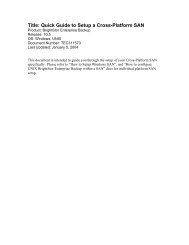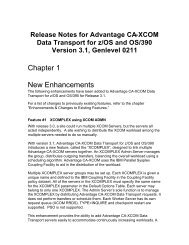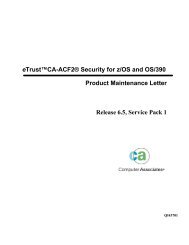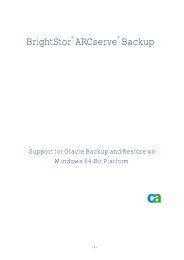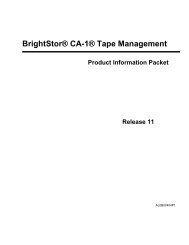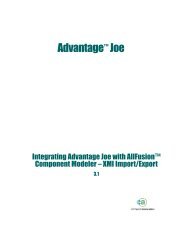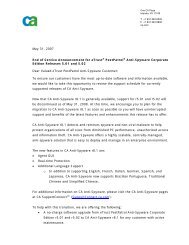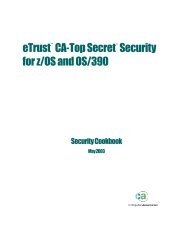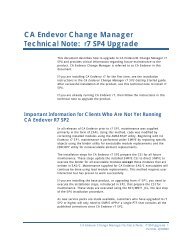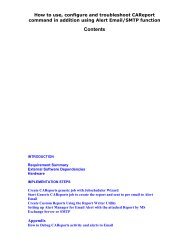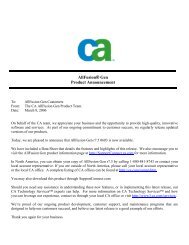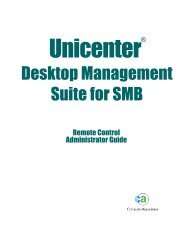Configuring AutoSys and CA-7 for Cross-Platform ... - SupportConnect
Configuring AutoSys and CA-7 for Cross-Platform ... - SupportConnect
Configuring AutoSys and CA-7 for Cross-Platform ... - SupportConnect
You also want an ePaper? Increase the reach of your titles
YUMPU automatically turns print PDFs into web optimized ePapers that Google loves.
Page 14<strong>CA</strong>-7Configuration of Mainframe Common ServicesNote: A recycle of <strong>CA</strong>-7 <strong>and</strong> ENF will be required to pick up changes as implementedin the next 2 sections. You do not need to recycle either product until Step 11 of‘<strong>Configuring</strong> <strong>CA</strong>-7 <strong>for</strong> Bi-Directional Scheduling with <strong>AutoSys</strong>).1. When configuring Common Services it is a good idea be<strong>for</strong>eh<strong>and</strong> to double check yourrelease <strong>and</strong> patch levels of the mainframe Common Services (<strong>for</strong>merly <strong>CA</strong>90’s) <strong>and</strong> tocontact <strong>CA</strong> Technical Support <strong>for</strong> any HYPERS or recommended PTFs. Optimally yourrelease level should be current, but try not to use anything lower than 2.2 SP1 +required patches that can be obtained via <strong>SupportConnect</strong> or Technical Support. Todetermine the level of <strong>CA</strong>90’s you can check in the output of the <strong>CA</strong>IENF started task <strong>for</strong>message <strong>CA</strong>S9075I.2. Validate the type of TCP/IP that you are using. The type of TCP/IP used will dictate thegateway proc, CCI proc, <strong>and</strong> Common Services FMIDs to be installed. The following arethe various types:‣ TCPIPGW: Peer to peer support <strong>for</strong> IBM TCP/IP using LE/MVS runtime.‣ TCPIP3GW: Peer to peer support <strong>for</strong> TCPAccess TCP/IP versions 3.1 <strong>and</strong> 4.1.‣ TCPIPSGW: Peer to peer support <strong>for</strong> IBM TCP/IP using SAS/C runtime in placeof IBM's LE.3. Ensure that all of required Common Services FMIDs are installed. Below is a list of theseFMIDs. If any FMIDs required are currently not installed please install them be<strong>for</strong>econtinuing. Refer to the Common Services Installation <strong>and</strong> Maintenance Guide <strong>for</strong>instructions.FMIDCS91000CW11000CW21000CW41100Common Services Product Name <strong>and</strong> Description<strong>CA</strong>IRIM – <strong>CA</strong> Resource Initialization Manager<strong>CA</strong>IENF – <strong>CA</strong> Event Notification Facility<strong>CA</strong>ICCI – <strong>CA</strong> Common Communications InterfaceCF33100 <strong>CA</strong>-C Runtime 3.1 – <strong>CA</strong> C Language Runtime Facility Release 3.1Important Note be<strong>for</strong>e Proceeding:Steps 4-5 below are only required if you are using proc CCITCPGW <strong>and</strong> the programexecuted <strong>CA</strong>S9CTPM, commonly known as the “C version” as it is written in the Clanguage. The other program that may be executed is <strong>CA</strong>S9ATPM <strong>and</strong> does not requirethese steps.4. Make sure IBM fix PTF UQ43223 (APAR PQ38033) has been applied <strong>and</strong> activated. Itis packaged in with OS/390 release 2.10 but it is important that the TCPIP re-entrantlibraries have been rebuilt. This is done by running the EDCLIB proc substituting thefollowing exec statements <strong>for</strong> the existing //EXEC statement: (run this process once <strong>for</strong>each exec statement)Page 14 of 22



